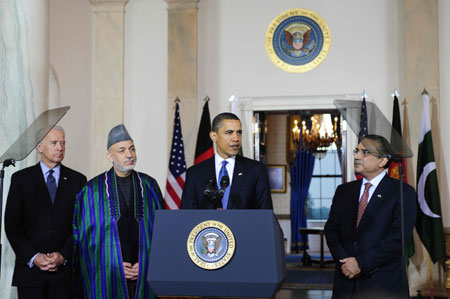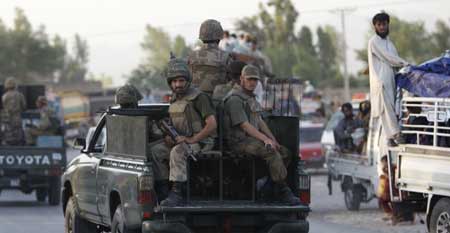Washington has heard much talk recently of increased US cooperation with Pakistan in tackling terrorism within that country's borders.
 |
|
US President Barack Obama (C) talks to reporters as Afghanistan's President Hamid Karzai (2nd L), Pakistan's President Asif Ali Zardari (R) and US Vice President Joe Biden stand on at the White House in Washington May 6, 2009. [Zhang Yan/Xinhua]
|
But despite a show of solidarity between the two countries at a recent Washington summit, Pakistan's deep mistrust of the US remains a significant factor hindering the smooth progress of the joint anti-terrorism actions along Pakistan-Afghanistan border, US officials and analysts say.
With Pakistani leader Asif Ali Zardari by his side, President Barack Obama pledged "lasting commitment" to combating terrorism in Pakistan at a recent news conference.
This comes at a time when the Taliban's territorial gains in Pakistan have caused consternation among US officials. While Pakistan's strong military makes a Taliban takeover unlikely, US intelligence analysts said the incursions could give militants more freedom to plan attacks – against both US and Pakistani interests – and boost al-Qaida's ability to recruit new members.
Moreover, US officials fear a worst case scenario in which Pakistan's nuclear arsenal could fall into the wrong hands – which makes it all the more reason to seek a secure Pakistan.
However, US efforts to root out militants – the C.I.A. has flown drones over Pakistan's frontier areas for years – are viewed in Pakistan as an intrusion of sovereignty and are blamed for fueling anti-Western sentiment in the country.
"The drone has become a powerful symbol of perceived US infringement on Pakistan's territorial integrity," Sherry Rehman, a member of the National Assembly of Pakistan, said recently in Washington.
 |
|
Soldiers pass fleeing civilians on the border of Malakand and Mardan districts of Pakistan's North West Frontier Province, about 150 km (85 miles) north west of Islamabad May 10, 2009.[Xinhua]
|